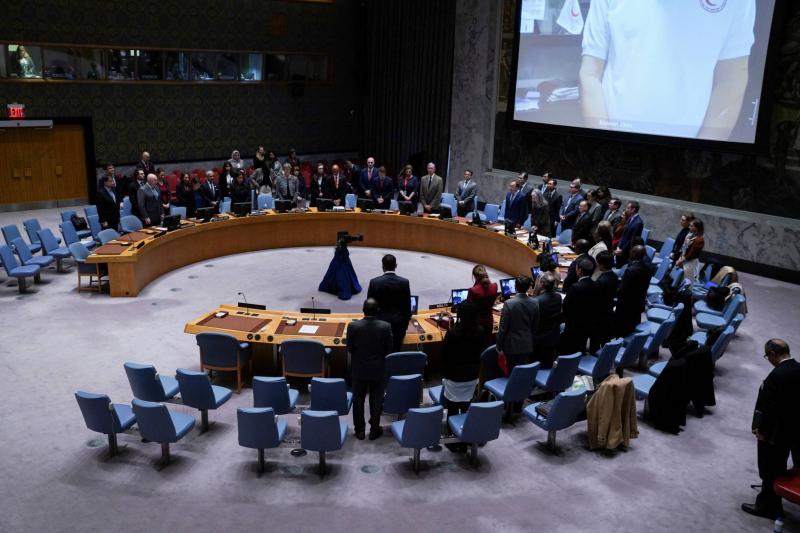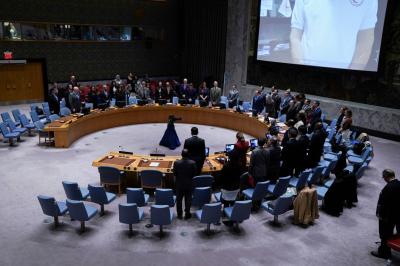The United Nations Security Council failed today, Friday, to pass a resolution calling for a ceasefire in Gaza after the United States used its veto. Following the veto, the U.S. Deputy Ambassador to the UN stated that "the draft resolution is disconnected from reality and will have no impact on the ground." Meanwhile, both France and the UAE expressed regret over the thwarted resolution. The United Kingdom abstained from voting, arguing that the resolution did not condemn the violations occurring in Gaza, with the British representative commenting: "It is true that Hamas has made mistakes, but the Palestinian people need a homeland and stability." China thanked the UAE for preparing the draft resolution and expressed regret over the veto, with the Chinese representative stating: "Any negative behavior is unacceptable and tolerating the continuation of fighting constitutes collective punishment for the residents of Gaza." China called for an end to the fighting in Gaza and for keeping the hope of peace in the Middle East alive. The Russian Deputy Representative remarked that "blocking a ceasefire is an American death sentence for thousands, perhaps tens of thousands of Palestinians."
Palestinian Representative Riyad Mansour commented: "It is a disaster that the Council is prevented once again from fulfilling its role in stopping the war on Gaza to protect the lives of millions of Palestinians. Hundreds are killed every day in Gaza amid world silence and the helplessness of the Security Council while the killer remains indifferent. How can the refusal of a resolution that calls for stopping a war that has killed thousands of civilians and displaced millions be justified?" He added: "We will make further efforts to hold accountable those responsible for the massacres occurring in Gaza. We will return to the UN General Assembly to do everything we can to stop the war on Gaza. The world sees the massacres committed against civilians in Gaza, but some insist on supporting Israel in killing civilians." He continued: "A new draft will be submitted soon to the Security Council requesting a halt to the war on Gaza. Those who refuse a resolution to stop the war are blind and do not see the scale of the humanitarian disaster there."
The Security Council held a session on the situation in the Middle East, including the Palestinian issue, in response to a letter sent by the UN Secretary-General invoking Article 99 of the UN Charter. Given the scale of human loss in Gaza and Israel in a short period, Guterres sent a letter to the President of the Security Council activating Article 99 for the first time. This article states that "the Secretary-General may draw the attention of the Security Council to any matter that he deems may threaten the maintenance of international peace and security."
UN Secretary-General Antonio Guterres announced today, Friday, that "there is no effective protection for civilians in Gaza" and that "there is no safe place in the sector." He emphasized the necessity for "the international community to do everything it can to end the plight of the people of Gaza," urging the Security Council to "spare no effort to push for an immediate ceasefire for humanitarian reasons, to protect civilians and to ensure urgent delivery of life-saving assistance." The Secretary-General stated that he sent his letter to the Security Council using Article 99 of the Charter "because we have reached a breaking point, there is a great risk of a complete collapse of the humanitarian support system in Gaza, which will have devastating consequences." He noted that "the situation could lead to a total collapse of public order and increased pressure for mass displacement to Egypt," adding that "the risk of a collapse of the humanitarian system is mainly related to the lack of protection for UN staff in Gaza and the nature and intensity of military operations that greatly restrict access to those in desperate need of assistance."
The Secretary-General stated that "the threat to the safety and security of UN staff in Gaza is unprecedented, with more than 130 of my colleagues already killed, many of them with their families. This is the largest single human loss in the history of our organization." His comments came just hours before the UN Security Council was to vote on a demand for a ceasefire for humanitarian reasons in the war between Israel and the Hamas movement.
For his part, the Permanent Observer of the State of Palestine at the United Nations, Riyad Mansour, urged the Security Council to "vote on the resolution proposed by the United Arab Emirates—an Arab member of the Council—'in the name of humanity, justice, and peace.'" He added that what is happening in Palestine now and what will happen next "will determine the future of our region for generations to come and will affect relationships and perceptions worldwide for generations ahead." He emphasized that now is the time for courage, decisiveness, and action, stressing the need to act now. He pointed out that the United Nations has been the target of "abhorrent attacks" for adhering to its mandate as outlined by member states, adding that "it is the duty of member states to reject such attacks and put an end to them, especially at a time when UN personnel on the ground are also victims."
Mansour said: "This is a moment of truth," noting that "the Israeli goal is clear, which is to force people to flee, regardless of how many times some say that will not happen." He added that this war "is part of an attack aimed at eradicating the Palestinian people as a nation and destroying the Palestinian cause.... The Palestinian people will not die in vain. The Palestinian people deserve respect." He warned that everything built after World War II was to prevent the atrocities "now happening in Gaza against the displaced Palestinian people," adding that "the war criminals committing these acts are unrepentant. Instead of being blamed, they blame and attack everyone."
In contrast, Israeli Ambassador to the UN Gilad Erdan criticized the lack of "use of Article 99 of the UN Charter regarding wars and other conflicts, such as happened in Ukraine, Syria, and Yemen." Speaking to Council members, Erdan said: "The only way to achieve peace is to support Israel's mission, not call for a ceasefire. For those of you calling for a ceasefire, you must remember the facts." The Israeli ambassador asserted that failing to destroy Hamas would lead to "the repetition of these atrocities," insisting that "calling for a ceasefire means prolonging the suffering of all and enhancing Hamas's control over Gaza, sending a message of tolerance to Hamas for deliberate atrocities, and giving Hamas's repression of Gaza a green light from the international community." He stated that "Hamas wants to increase the number of dead and injured among civilians in Gaza, so it hides behind and beneath civilian populations, using them as human shields," and accused Hamas of fabricating "the number of casualties in Gaza." Erdan affirmed that "Israel will continue its mission to eliminate all of Hamas's destructive capabilities and return all hostages." He continued: "We will continue our mission while supporting every humanitarian initiative to improve conditions for the residents of Gaza. Those truly seeking peace and security in the region must understand that the only way to achieve that is to destroy Hamas and not call for a ceasefire, which will only extend the war and sufferings of all—there is no other option."
In this context, the Deputy Permanent Representative of the UAE to the UN, Mohammed Abu Shehab, affirmed that this war "has brought our region to a breaking point, but its impact has extended far beyond that," noting an "awful increase" in incidents of anti-Semitism and Islamophobia worldwide. He warned that the international system is teetering on the brink "because this war has shown that power is the source of right, and adherence to international humanitarian law depends on the identity of the victim and the perpetrator." Abu Shehab stated that the Secretary-General, every head of UN agencies, humanitarian organizations, and the vast majority of the world's population have repeatedly called on Council members to put a permanent and sustainable end to this violence. He indicated that his country had proposed a resolution calling for an immediate ceasefire on humanitarian grounds "to achieve that goal." He noted that activating Article 99 of the UN Charter should represent a turning point, stating that it is "an official reflection of the desperate plight in Gaza and the urgent need for the Council to act." He emphasized that "the Security Council must act when only a very little amount of aid is being delivered, and humanitarian workers are unable to deliver it for fear of being killed," adding: "The Council must act when the blockade on Gaza becomes a major source of death."
The Russian Deputy Permanent Representative to the UN, Dmitry Polyansky, called for an "end to the cycle of violence," confirming that "his country adds its voice to many calls for a sustainable ceasefire and a return to addressing the root causes of this conflict, ending the humanitarian disaster in the Gaza Strip." He stated that "Russia categorically rejects any actions that may lead to the deaths of civilians, including women and children, and does not accept any plans for the forced displacement of Gaza's inhabitants to the south, which would represent a new Nakba for the Palestinian people." Polyansky emphasized that "his country values all constructive initiatives from the Security Council aimed at normalizing the situation and paving the way for serious negotiation between Palestinians and Israelis," referring to what he described as "attempts by one Council member to delay and undermine these joint efforts." He added that "under these questionable schemes, Russia has stood and continues to stand beside the legitimate aspirations of the Palestinian people to establish their independent state within the borders of 1967 with East Jerusalem as its capital, coexisting peacefully and securely with neighboring Israel." Polyansky confirmed his country's support for the resolution proposed by the UAE, calling for a vote in favor of it today.
For his part, the U.S. Deputy Ambassador to the UN, Robert Wood, indicated to the Council that "his country does not support calls for an immediate ceasefire," adding that "it will only sow the seeds for the next war, as Hamas does not seek to achieve lasting peace or a two-state solution." He criticized what he described as the Security Council's failure to condemn Hamas's attacks on October 7, stating that "the movement will continue to hold hostages if Israel unilaterally lays down its arms today as some countries are demanding." He pointed out that "the United States, while supporting Israel's right to defend its people against horrendous atrocities, is conducting high-level intensive diplomatic efforts to save lives and lay the groundwork for lasting peace."
The Council is expected to vote later today, Friday, New York time, on a resolution submitted by the United Arab Emirates. The draft resolution calls for an immediate ceasefire for humanitarian reasons and reiterates demands for all parties to comply with their obligations under international law, including international humanitarian law, particularly regarding the protection of civilians. It demands the immediate and unconditional release of all hostages and guarantees humanitarian aid access. Diplomats have disclosed that the vote on the UN Security Council resolution calling for an immediate ceasefire for humanitarian reasons in the war between Israel and the Palestinian Islamist movement Hamas in the Gaza Strip has been postponed until 5:30 PM (22:30 GMT) today. The 15-member Council was scheduled to vote on the resolution drafted by the UAE this morning.




